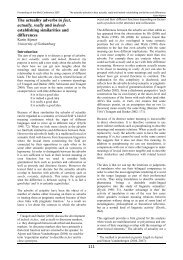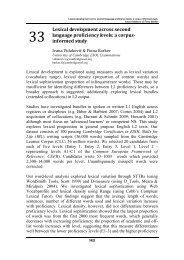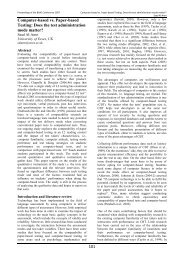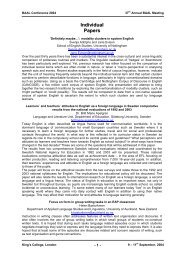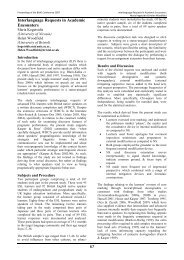Proceedings of the - British Association for Applied Linguistics
Proceedings of the - British Association for Applied Linguistics
Proceedings of the - British Association for Applied Linguistics
Create successful ePaper yourself
Turn your PDF publications into a flip-book with our unique Google optimized e-Paper software.
The Impact <strong>of</strong> <strong>Applied</strong> <strong>Linguistics</strong>: <strong>Proceedings</strong> <strong>of</strong> <strong>the</strong> 44th Annual Meeting <strong>of</strong> BAAL<br />
University <strong>of</strong> <strong>the</strong> West <strong>of</strong> England<br />
Data<br />
The dataset <strong>for</strong> <strong>the</strong> analysis is a set <strong>of</strong> asynchronous online exchanges and<br />
synchronous chat sessions that have taken place on <strong>the</strong> site over several<br />
years with successive groups <strong>of</strong> participants. We analysed <strong>for</strong>um data from<br />
7 years <strong>of</strong> archived material on <strong>the</strong> Moodle site and carried out semistructured<br />
end-<strong>of</strong>-course interviews with 15 <strong>of</strong> <strong>the</strong> Glasgow-based<br />
participants, including both English native speakers and non-native<br />
speakers.<br />
Evidence <strong>of</strong> ICC in <strong>for</strong>um data<br />
The textual evidence from <strong>the</strong> native and non-native speaker <strong>for</strong>um<br />
interactions provides evidence <strong>of</strong> developing ICC over <strong>the</strong> course <strong>of</strong> an<br />
academic session. This emerges in a number <strong>of</strong> ways (all examples from<br />
<strong>for</strong>um data, our italics):<br />
i. Topics framed with reference to students’ own observations:<br />
“I have noticed that <strong>the</strong> way in which <strong>for</strong>eign languages are taught in<br />
schools differs greatly…”<br />
ii. Participants providing a gloss <strong>for</strong> culture-specific terms, or <strong>of</strong>fering a<br />
contrast with a better-known cultural analogue:<br />
“Hi, I’m from Glasgow and growing up we went ‘guising’ which just<br />
meant that we dressed up in various costumes and roamed <strong>the</strong><br />
neighbourhood knocking on doors. I don’t think it’s <strong>the</strong> same as <strong>the</strong><br />
American ‘trick or treating’ as <strong>the</strong>re was never a retaliation <strong>for</strong> not<br />
being given sweets.”<br />
iii. Participants reflecting on <strong>the</strong> reception <strong>of</strong> <strong>the</strong>ir contributions and<br />
apologising <strong>for</strong> potentially obscure postings:<br />
“Sorry, just realised I made reference to someone who may not be<br />
universally known!!”<br />
Evidence <strong>of</strong> ICC in interview data<br />
As described by participants, <strong>the</strong>re are various benefits <strong>of</strong> online<br />
intercultural exchange. These include (all examples from interview data):<br />
6



